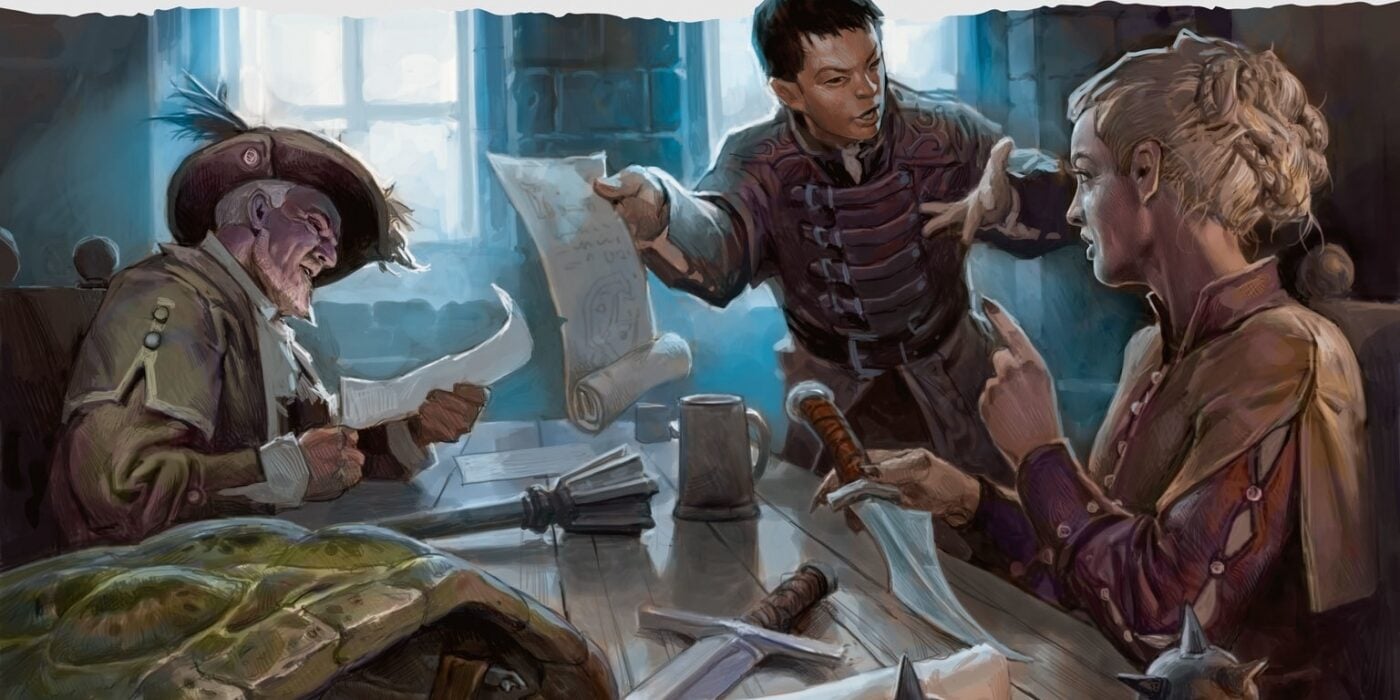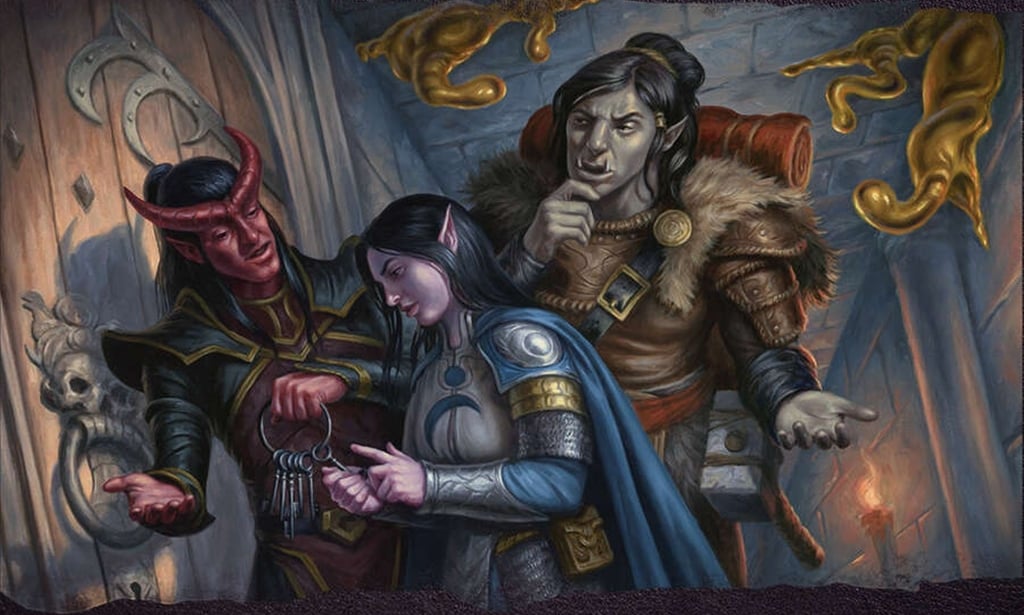D&D Has Rules For That Too!? – Five More D&D Rules You Didn’t Know About


5th Edition is streamlined and accessible, to the point where you might not have known it D&D has rules for harvesting poison.
One of the best things about D&D 5th Edition is that the rules “get out of the way” when you don’t need them. To the point that you might not even know these D&D rules exist.
There’s a running joke that goes something like this: any time you feel like you need to houserule something, check the DMG, it’s already there. By and large, it’s true. From harvesting poison to getting half cover, here are five rules you didn’t know were in D&D 5th Edition.
Harvesting Poison (pg. 257-258, DMG)
Did you know you can just get poison sometimes? And you can apply it to your weapon? Sure you have to be proficient with certain things.
But the next time you need to give yourself an edge in battle—say you’re going into a one-on-one death match against this upstart who calls himself Muad’dib and you want just a little bit of poison on your knife for good measure – you can harvest some from a vanquished or incapacitated creature.
“A character can instead attempt to harvest poison from a poisonous creature such as a snake, wyvern, or carrion crawler. The creature must be incapacitated or dead, and the harvesting requires 1d6 minutes followed by a DC 20 Intelligence (Nature) check. (Proficiency with the poisoner’s kit applies to this check if the character doesn’t have proficiency in Nature.) On a successful check, the character harvests enough poison for a single dose. On a failed check, the character is unable to extract any poison. If the character fails the check by 5 or more, the character is subjected to the creature’s poison.”
And furthermore, if you’re proficient with poisoner’s tools, you’re never at risk of poisoning yourself. Now all you have to do is carry around some snakes, wyverns, or carrion crawlers.
Worried About Counterspell? Use a Wand (pg. 141, DMG)
You could also use a scroll, a staff, or any other item that lets you cast a spell.
Counterspelling is one of those annoying arms races. You’re trying to solve a problem with a spell, the enemy spellcaster doesn’t want you to cast it. They counterspell your spell, you counterspell their counterspell, and someone else counters your counter.
It’s a cycle that Blue Magic the Gathering players know well. Nobody but those sickos like it. Fortunately, you can play around with counterspell. And one of the easiest ways is to cast a spell through a magic item.
“Some magic items allow the user to cast a spell from the item, often by expending charges from it. The spell is cast at the lowest possible spell and caster level, doesn’t expend any of the user’s spell slots, and requires no components unless the item’s description says otherwise…”
No components mean no verbal, somatic, or material components at all. This, per the counterspell rules referenced through Subtle Spell and Xanathar’s Guide, means you can’t counter a spell cast through an item.
You Can Run, But You Can’t Hide (From a Ranger) (pg. 253, DMG)
The chase rules are some of the most fun under-utilized rules in D&D. It’s all the thrills, all the chills, all the action of a good fantasy chase. Overturned apple carts, quick dodges down dark alleys – it’s all there. And you can use these rules to have an enemy try and escape. Or even to have your party try and escape.
But even Chase rules have under-utilized rules within them. For instance, did you know you have a much harder time hiding from someone if they are a Ranger? It’s true.
When a creature is attempting to make a stealth check to escape from a chase, it has disadvantage if the lead pursuer is a Ranger or has proficiency in Survival.
If You Cast a Spell – Even a Cantrip You Don’t Rest (pg. 186, PHB, Sage Advice)
D&D is full of fantasy adventurers settling down to take a nap. In fact, getting rest is important to your adventuring party. A big part of the power fantasy of D&D is that you routinely get 8 hours of sleep and feel refreshed afterward.
Although, just like in real life, if you want to rest you have to actually, y’know, rest. Page 186 of the PHB says that during a short rest, you can do “nothing more strenuous than eating, drinking, reading, and tending to wounds.”
You can’t answer a few fantasy emails or have a short chat. Reading is great–but anything more than that interrupts your rest, including casting spells. Even if they’re spells to make your rest more restful, you have to do those before you rest. A batch of errata in 2020 made this explicitly clear:
You Can Auto-Succeed on Skill Checks – If You Have the Time (pg. 237, DMG)
In the days of 3rd edition you could, if you weren’t in a hurry, you could “take 10” or even “take 20.” This basically amounted to ‘if you weren’t under stress or didn’t have any consequence for failure other than the time spent making the attempts, you could take longer than normal to treat the skill check as though you’d rolled a 10 or a 20 on your d20.
That went away in 5th Edition, or so people thought. But, in the DMG it makes it clear that, if all it takes is time – you can just auto-succeed. It’ll take you 10 times as long, but you can do it.
Sometimes a character fails an ability check and wants to try again. In some cases, a character is free to do so; the only real cost is the time it takes. With enough attempts and enough time, a character should eventually succeed at the task. To speed things up, assume that a character spending ten times the normal amount of time needed to complete a task automatically succeeds at that task.
It goes on to say that no amount of time makes an impossible task successful. You can’t eventually pick the lock of a door that’s been barred, for instance. But it helps speed things along. So if you want to “take 10” in 5th Edition, you can—and you’ll auto-succeed. As long as you’re not in a hurry, you’re golden. But sometimes the difference between kicking the door in 6 seconds vs. 1 minute can mean life or death.
What under-used D&D rules do you use in your game?








